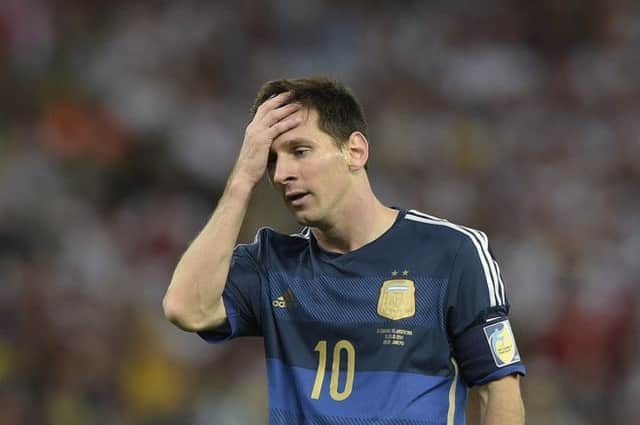World Cup: Messi blows chance for greatness


Messi’s features are usually a blank mask, but his frustration showed, mouth sagging open as he wiped the sweat from his brow. Even he, preternaturally self-confident as he must be, must have wondered if that was the chance, if that miss would haunt him through sleepless nights for the rest of his life. It took a long time for the fatal blow to fall, but as Mario Götze took down Andre Schurrle’s cross and volleyed in, the confirmation came.
Gonzalo Higuain also missed a glorious chance in the first half but the personal stakes were rather different. This had, after all, been designated as Messi’s tournament. Even when he signed his first professional contract with Barcelona in 2003, his father sought to agree a deal that expired in summer 2013; if his son wasn’t playing regularly a year before the World Cup when he would, in theory, be at his peak, he wanted him to have the opportunity to move on. In the end, Barcelona persuaded him to sign till 2014 – and there have subsequently been countless extensions – but the fact the thought was there, even then, even 11 years ago when he was just 16, is telling.
Advertisement
Hide AdAdvertisement
Hide AdThat sense of destiny must weigh a player down and that perhaps is why Messi had an odd tournament. From one point of view he had flickered on the periphery, involved only fleetingly, and yet at the same time his impact had been profound. His father was reported to have said he was exhausted, that his legs felt as though they weighed 100kg, and although the Messi camp has since insisted the line is apocryphal, it was certainly believable.
Perhaps the way he had played was a consequence of that weariness, conserving his energy, waiting for his moment. Or perhaps it was a consequence of how Argentina played and how their opponents played, that Messi was so tightly marked that his direct influence was naturally curtailed, his role becoming to restrict the number of players other sides could commit forward.
For all Argentinians wanted history to repeat, Messi in this tournament has not been Diego Maradona in 1986. He did not take every game and drag his side through it. Before the final, he ran only 8.15km per 90-minute game - roughly 15 per cent down on the figure for the average outfielder. His top speed (albeit the stats don’t measure movement with the ball which, for a player of his type, seems more relevant) is only 29.6kph, which is 2kph slower than Mario Yepes, a centre-back more than a decade older. And yet, for all that, he has been decisive.
It was his brilliant second that settled the game against Bosnia. It was he who created the sliver of space to down Iran with a superb shot. It was he who scored twice against Nigeria, he who created the winner against Switzerland with a sudden burst and pass beyond opponents who panicked a the mere sight of him running at them, and it was his turn and pass that created the confusion that ultimately led to the winner against Belgium. Perhaps he was rather quieter against the Netherlands in the semi-final, but even then, he created a golden late opportunity for Maxi Rodriguez, while the way the Dutch set up to counter him led to Wesley Sneijder playing deeper, reducing his influence and so restricting the supply to Arjen Robben. The statistics show that Messi has created more goalscoring opportunities than any other player and yet his was a World Cup of minimalist menace.
But this was more like the Maradona of 1990 than 1986, flickering and inspiring with glimpses of remembered potential rather than driving from the front.
For many in Argentina, the main man had become less Messi than Javier Mascherano, who ended the semi-final with a bruised head and a torn anus after a performance of indomitable and indefatigable distinction. It was he who became the subject of internet memes back at home, many punning on “Masche” and depicting him as Che Guevara, mapping his features onto the famous Robert Cappa photograph of El Che.
Once again, Messi’s involvement was fleeting but compelling. There was an early run down the right, when he roasted Benedikt Howedes only for his cutback to be intercepted. Then, on the half-hour, he controlled an awkwardly bouncing ball from Marcos Rojo on his thigh and, in one movement, swept the ball out to the left for Ezequiel Lavezzi. Higuain was offside as he swept in the low cross, but that didn’t alter the majesty of Messi’s pass, both in terms of conception and execution.
With Higuain and Aguero still some way short of their best on their returns from injury, Messi’s incursions at times seemed the only hope for Argentina. Five minutes before the break he ran on to a long ball over the top, nodded the ball past Mats Hummels and burst past him, only to be denied with an effort from a narrow angle by the outstretched arm of Neuer.
Advertisement
Hide AdAdvertisement
Hide AdThere were moments in the second half too: a dart infield that led to him curling a shot wide, a clever jabbed pass to Sergio Aguero that would have set him through had the Manchester City forward not slipped. But by extra-time his influence had waned, and it was hard not to wonder whether Alejandro Sabella had erred in withdrawing Lavezzi, with his pace and direct running, at half-time.
After Götze had scored, Messi looked exhausted, a ghostly figure stalking the turf in dejection. An injury-time free-kick offered a final shot at redemption; he blasted high and wide. In four years, perhaps there will be another chance, but he will be 31 by then, and the 2005 Under-20 World Cup winning side on which this team is based will be fading. Messi had his chance and, wonderful player though he is, he blew it.